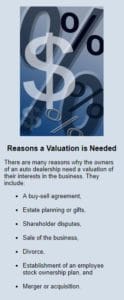
Many auto dealership owners have a preconceived notion of what their businesses are worth. It might be based on a “rule of thumb” such as a specified multiple of vehicle sales, the dealership’s revenue stream, a percentage of earnings or “book value.” However, while these factors may give you an idea about a business’ net worth, they hardly represent the entire picture.
So how can you find out the value of your dealership? For starters, it is helpful to pinpoint comparable sales of auto dealerships in the area for a guide towards providing a range of values. Unfortunately, finding comparable sales can be difficult or nearly impossible to do. In most cases, sales reflect variations in franchise, location, management efficiency and a variety of other factors. In addition, for a comparable purchase to be truly meaningful, it should indicate a trend that is indicative of existing market conditions, rather than a just an isolated sale.
Keeping that in mind, here are four key areas that can have an impact on an auto dealership’s valuation:
1. Location – Just as with residential real estate, location is one of the primary, critical factors. Typically, dealerships are bound by long-term facility leases and franchise marketing restrictions. Because a dealership property usually is a single-purpose property, an owner can expect a precipitous drop in value if the business has plans to pull up stakes.
2. Differences in franchises – Absent unusual circumstances, it is understandable that a Mercedes or BMW dealership yields a higher value than a dealership for, say, Kia, even if the volume and net profit are comparable. The franchise value of an asset is directly related to the factory long-term outlook, stability and product supply. Also note that franchise value can change substantially in a short period of time. This has been seen when improved product reliability and longer warranties became available in some franchises.
3. Economic conditions – Of course, a dealership doesn’t exist in a vacuum. The value of the business is affected by events both small and global in scope. For instance, increases in gasoline prices have resulted in a greater interest by consumers in certain types of vehicles and a decrease in others. This could affect the market value for a particular dealership. Also, changes in the surrounding geographic area can help or hurt the volume and profitability of an operation.
4. Franchise alignment – Strategic alignments within the automobile industry remain critical to the long-term planning of manufacturers. For instance, it is difficult to place a value on a stand-alone Cadillac dealership when it is known that the factory may not approve an outside buyer unless the franchise is aligned with Buick and GMC. Similar complications may arise for valuations in a “zone” franchise. The existence of alignments, or the absence of them, could have a significant effect on a valuation.
In summary, each dealership must be carefully evaluated by an expert in the field to determine its approximate value in today’s marketplace. There is no real substitute for this process.
It is crucial for dealership owners to valuate their businesses. If you would like to discuss some of the methods discussed in this article, contact Keith Laudenberger today.
Councilor, Buchanan & Mitchell (CBM) is a professional services firm delivering tax, accounting and business advisory expertise throughout the Mid-Atlantic region from offices in Bethesda, MD and Washington, DC.




